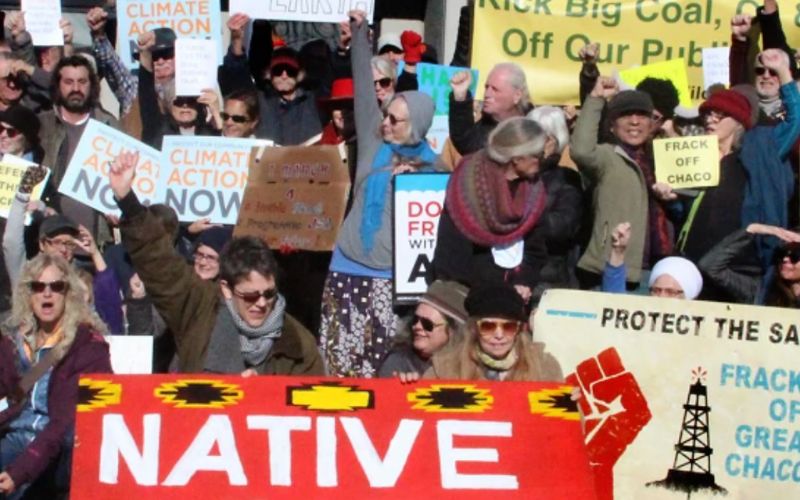
- Details
- By Kaili Berg
The Greater Chaco Coalition is calling upon Secretary of the Interior Deb Haaland (Laguna Pueblo) to follow through with her promise to protect the culturally significant Greater Chaco Region in New Mexico.
In 2021, in response to callouts from Tribes, Pueblos, and environmentalists, Haaland launched the Honoring Chaco Initiative, a two-phase initiative involving the 10-mile mineral withdrawal around Chaco Culture National Park in northern New Mexico from future leasing and mining claims for the next 20 years. The area includes an expansive stretch of northwestern New Mexico that includes locations that are culturally significant to New Mexico Pueblos and area Tribes.
The Honoring Chaco Initiative aims to address cumulative environmental and social injustices by adopting a cultural landscape management framework. According to a report by the Bureau of Land Management (BLM), The main objective of Phase I was to prepare, design, and carry out a regional conversation centering on Tribal perspectives to define the vision and goals for protecting the region. Phase I, which included interviews involving 45 people, a situation assessment, two virtual planning sessions, and a three-day meeting in Albuquerque, concluded last fall. The process has since stalled.
The Pueblo and Hopi people have occupied the Great Chacho region for more than 2,000 years. Chaco Canyon was the setting of ceremonies, trade, and political activity.
“This region has been managed as a sacrifice zone for far too long,” Daniel Tso, former Navajo Nation Council Delegate, said in a press release from the Greater Chaco Coalition, a Native-led group seeking to protect the Greater Chaco Landscape.
The Coalition alleges The Bureau of Land Management continues to approve new oil and gas activities in the area and is failing to protect the cultural landscape.
“Now is the time for the Honoring Chaco Initiative to chart a new path forward for Navajo communities, phasing out extractive economies and centering protection of the land, air, water, and the sacred in Greater Chaco Landscape management,” Tso said.
Earlier this year, the Greater Chaco Coalition provided the Department of the Interior and the Bureau of Land Management with a road map to ensure that the outcomes of the Honoring Chaco Initiative are long-lasting.
Now, advocates are urging Haaland to enter phase two of the Initiative.
“It’s high time that the Interior Department honor the Greater Chaco Landscape by phasing out fossil fuels on public lands,” Silas Grant, New Mexico Campaigner with the Center for Biological Diversity, said in a press release. “The long history of extraction in this region has had devastating effects on land, air, water and public health across the Greater Chaco region. The administration must clean up this mess.”
More Stories Like This
Trump signs law that revokes some limits on drilling in Alaska’s National Petroleum ReserveSouthern Sierra Miwuk Nation Gets 900-Acres ofLand Back
Chilkat Indian Village Tells New Palmer Mine Owners They Are “Not Welcome” in Chilkat Valley
Tribes, Coastal Group Ask Army Corps to Revoke Permit for Texas Export Terminal
Michigan Tribes Tell Supreme Court: Don’t Bail Out Enbridge
Help us defend tribal sovereignty.
At Native News Online, our mission is rooted in telling the stories that strengthen sovereignty and uplift Indigenous voices — not just at year’s end, but every single day.
Because of your generosity last year, we were able to keep our reporters on the ground in tribal communities, at national gatherings and in the halls of Congress — covering the issues that matter most to Indian Country: sovereignty, culture, education, health and economic opportunity.
That support sustained us through a tough year in 2025. Now, as we look to the year ahead, we need your help right now to ensure warrior journalism remains strong — reporting that defends tribal sovereignty, amplifies Native truth, and holds power accountable.
 The stakes couldn't be higher. Your support keeps Native voices heard, Native stories told and Native sovereignty defended.
The stakes couldn't be higher. Your support keeps Native voices heard, Native stories told and Native sovereignty defended.
Stand with Warrior Journalism today.
Levi Rickert (Potawatomi), Editor & Publisher


